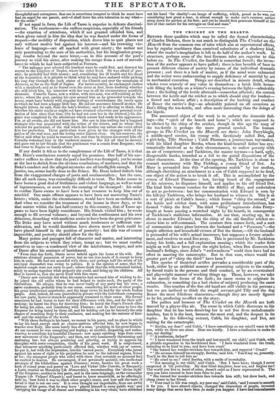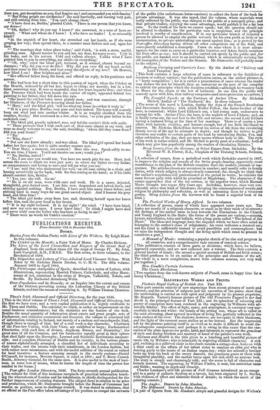THE CRICKET ON THE HEARTH.
BEYOND those qualities which may be called the formal characteristics of Charles Dickens, there is not much to distinguish The Cricket on the Hearth from the common run of tales which aim at supernatural effects, less by regular machinery than contrived substitutes of a shadowy kind, where the reader's imagination is left to do half of the author's work. In structure, perhaps some of the best German tales are superior to this before us. In The Cricket, the fancifid is somewhat forced ; the inven- tion of the author appears to have palled ; there is less breadth of base to present different classes of society by means of the individual dramatis personte ; and there is a lack of matter, as if the mind were exhausted and the writer were endeavouring to supply deficiency of material by art in mechanical execution. Things are described in minute detail, whose wholes were scarcely of any value in themselves : a brisk little house- wife filling the kettle on a winter's evening between the lights—admirably done ; the boiling of the kettle aforesaid—somewhat affected ; the contest between the kettle and the cricket as to which should sing the loudest— a forced and tedious affair ; a description of the barking and conduct of Boxer the carrier's dog—as admirably painted on all occasions as Dot's filling the tea-kettle, and often more interesting than the doings of the bipeds.
The announced object of the work is to enforce the domestic feel- ings—the "spirit of the hearth and home"; which are supposed to be elicited by the chirp of the cricket, though in this age the song of the tea-kettle is perhaps the more general symbol. The human groups in The Cricket on the Hearth are three: John Peerybingle, a middle-aged carrier, his young wife, facetiously called Dot, and a girl-help, Tilly Slowboy ; Caleb Plummer, a journeyman toy-maker, with his blind daughter Bertha, whom the kind-hearted father has sys- tematically deceived as to their circumstances, to endow poverty with an air of competence; and Tackleton, the master toyman—a hard, ugly, disagreeable hunks, intended as a foil to the genial dispositions of the other characters. At the time of the opening, Mr. Tackleton is about to commit matrimony with May Fielding, a young friend of Dot. As Mary is persuaded into this "advantageous match" by her mother, although cherishing an attachment to a son of Caleb supposed to be dead, one object of the action is to break it off. This is accomplished by the return of Edward Plummer : but, having heard of the engagement of his mistress, he disguises himself, and applies to his old friend Dot. The kind little woman vouches for the fidelity of May, and undertakes to act as go-between : but her communication with Edward is seen by the kill-joy Tackleton, who brings her husband to witness it. This is at a sort of picnic at Caleb's house ; which forms "chirp the second," as the kettle and cricket duet, with some preliminary introductions, has formed "chirp the first." The third " chirp " represents John Peery- bingle at home passing a wretched night by his hearth, in consequence of Tackleton's malicious information. At one time starting up, he is about to murder Edward ; but the chirp of the old familiar cricket re- stores him to self-command. The creature then comes forth, and a sort of communion takes place between the husband and a "Presence,"—the simple affection and household virtues of Dot the theme,—till the husband is persuaded of his wife's actual innocence, but supposes a former attach- ment, and resolves to send Dot away. This is prevented by Mr. Tackleton losing his bride, and a full explanation ensuing; which the reader feels might as well have been given the night before, when Dot discovers her husband's feelings, since John's "awkwardness" could then have had no effect in marring the catastrophe. But in that case, where would the greater part of "chirp the third" have been?
This species of theatrical artifice pervades a considerable part of the book, either by an artificial manner of presenting subjects to the reader, by forced traits in the persons and their conduct, or by an overstrained and playwright manner of working things up. These, however, we take to be merely the forms of the fault ; its cause seems to originate in exhaustion, or something (as a bad choice of subject) producing the same results. Nice touches of the fine old hand are still visible in the persons ; but we are inclined to think the stupid servant-girl Tilly and the dog Boxer the most felicitous characters,—though they are merely figures to be let, producing no effect on the story.
The pathos and humour of The Cricket on the Hearth are both marred by a player-like air. The scene in which Caleb discovers to his daughter that he has been deceiving her is not free from melodramatic touches, but it is the best, because the most real, and the deepest in its topics. In the following extract, Caleb, his daughter, and Dot, are waiting for the catastrophe.
Bertha, my dear!' said Caleb, 'I have something on my mind! want to tell you, while we three are alone. Hear me kindly. I have a confession to make to you, my darling.' "'A confession, father? "'I have wandered from the truth and lost myself, my child,' said Caleb, with a pitiable expression in his bewildered face. I have wandered from the truth, intending to be kind to you; and have been cruel.'
"She turned her wonder-stricken face towards him, and repeated Cruel'.'
" ' He accuses himself too strongly, Bertha,' said Dot. You'll say so, presently. You'll be the first to tell him so.'
"' He cruel to me !' cried Bertha, with a smile of incredulity.
"Not meaning it, my child,' said Caleb. But I have been; though! never suspected it 'till yesterday. My dear blind daughter, hear me, and forgive me ! The world you live in heart of mine, doesn't exist as I have represented it. The eyes you have trusted in have been false to you.' "She turned her wonder-stricken face towards him still; but drew back, and clung closer to her friend. " Your road in life was rough, my poor one,' said Caleb, and I meant to smooth it for you. I have altered objects, changed the characters of people, invented many things that never have been Ito make you happier. I have had concealments
from you pot deceptions on you, God forgive me! and surrounded you with fancies.' " Butliving people are not fancies?' she said hurriedly, and turning very pale, and still retiring from him. Yon can't change them.' "'I have done so, Bertha,' pleaded Caleb. 'There is one person that you know, my dove—'
"Oh, father ! why do you say I know?' she answered, in a tone of keen re- proach. What and whom do I know! I, who have no leader ! I, so miserably blind!'
"In the anguish of her heart, she stretched out her hands, as if she were groping her way; then spread them, in a manner most forlorn and sad, upon her
" The marriage that takes place today,' said Caleb, is with a stern, sordid, grinding man. Allard master to you and me my dear, formany years. Ugly in his looks, and in his nature. Cold and callous always. Unlike what I have painted him to you in everything, my child—in everything.'
" 'Oh, why,' cried the blind girl, tortured, as it seemed, almost beyond en- durance;why did you ever do this ! Why did you ever fill my heart so full, and then come in like Death, and tear away the objects of my love Oh Heaven, how blind I am ! How helpless and alone !' "Her afflicted father hung his head, and offered no reply, in his penitence and SOITOW.
"She had been but a short time in this passion of regret, when the Cricket on the Hearth, unheard by all but her, began to chirp; not merrily, but in a low, faint, sorrowing way. It was so mournful, that her tears began to flow; and when the Presence which had been beside the carrier all night, appeared behind her, pointing to her father, they fell down like rain. 'She heard the cricket-voice more plainly soon; and was conscious, through her blindness, of the Presence hovering about her father. "'Mary,' said the blind girl, tell me what my home is—what it truly is.' "It is a poor place, Bertha; very poor and bare indeed. The house will scarcely keep out wind and rain another winter. It is as roughly shielded from the weather, Bertha,' Dot continued in a low, clear voice, as your poor father in his sackcloth coat.'
" The blind girl, greatly agitated, rose, and led the carrier's little wife aside. "' Those presents that I took such care of, that came almost at my wish, and were so dearly welcome to me,' she said, trembling; where did they come from ? Did you send them?'
"'No.'
" Who, then ? '
"Dot saw she knew already; and was silent. The blind girl spread her hands before her face again; but in quite another manner now.
"'Dear Mary, a moment, one moment ! More this way. Speak softly to me. You are true, I know. You'd not deceive me now; would you ?'
"'No, Bertha, indeed ! '
" ' No, I am sure you would not. You have too much pity for me. Mary, look across the room to ivhere we were just now; to where my father is—my father, so compassionate and loving to me—and tell me what you see.' "I see,' said Dot, who understood her well,' an old man sitting in a chair, and leaning sorrowfully on the back, with his face resting on his hand; as if his child should comfort him, Bertha:
"'Yes, yes: she will. Go on.'
" is an old man, worn with care and work. He is a spare' dejected, thoughtful, grey-haired man. I see him now, despondent and bowed down, and striving against nothing. But, Bertha, I have seen him many times before, and striving hard in many ways for one great sacred object. And I honour his grey head, and bless him!'
"The blind girl broke away from her, and, throwing herself upon her knees before him, took the grey head to her breast. " It is my sight restored. It is my sight ! ' she cried. I have been blind, and now my eyes are open. I never knew him ! To think I might have died and never truly seen the father who has been so loving to me!' "There were no words for Caleb's emotion."





























 Previous page
Previous page